Grwpiau
The history of Aerofilms Ltd
About the group This Group exists to tell the story of Aerofilms Ltd. Join up to add your knowledge and memories!
Wedi ei greu 18 June 2012
|
Katy Whitaker |
||
|
This building is currently part of the Metropolitan Police estate on the Peel Centre (Hendon Police College) site. It is known as Building No 36.
As part of the training centre redevelopment, it had been planned to demolish this building, as it is not listed. Thankfully, owing to considerable public indignation expressed during the consultation meetings, the Met were forced to review this decision. Building 36 will now be incorporated within the new development, albeit within an unsympathetic physical context. |

The Laird |
|
|
The first episode of the BBC Channel 4 programme "Brick By Brick: Rebuilding Our Past" was about moving the building from one side of the RAF Hendon site over to near the RAF Museum in order to make way for the housing development on the site. It is currently available on the BBC iPlayer at:
http://www.bbc.co.uk/iplayer/episode/b01flvwz/brick-by-brick-rebuilding-our-past-episode-1 It of course mentioned Claude Grahame-White, but I didn't spot any mention of Aerofilms as a company name. |

melgibbs |
|
|
This is the first post-War photograph taken by Aerofilms Ltd. Sadly the original negative hasn't survived - this version has been produced from an old print copy.
|

Laura Maddison |
|
|
This is the very last photograph taken by Aerofilms Ltd before Britain entered WW2. It was taken by Aerofilms photographer Bill Freeman, who coincidentally also took the first post-War photograph (EAW000001).
|

Laura Maddison |
|
|
Mrs Thelma Marshall, nee Hamilton-Jones, Aerofilms Ltd Librarian 1945-54, remembers this photograph being used by "Farmers' Weekly". It illustrated a story on how NOT to build ricks and stacks, because of the fire risk. If one went up in flames, the whole row might catch alight.
|
Katy Whitaker |
|
|
Auster G-AGXH appears in a photo posted online by David Whitworth, from the Tony Clarke Collection (http://www.flickriver.com/photos/dwhitworth/5467438303/). This shows the Aerofilms name and logo painted on the nose.
After the Second World War, Aerofilms Ltd used Austers to take their oblique aerial photographs. You can see how the high wing conveniently allows the camerman to shoot out of the cockpit window. Once you have opened the side window, the slipstream holds it open for you so you can concentrate on the photography! |
Katy Whitaker |
|
|
This overview of the area around the Royal Academy includes 29 Old Bond Street, where Aerofilms Ltd set up an office for sales - Thelma Hamilton-Jones worked there after demobilisation from the WAAF.
|
Katy Whitaker |
|
|
Here's a nice view of 6 Elstree Way, Borehamwood; the Huntings AeroSurvey's office, with Aerofilms, which Francis Wills found for the firm to move into. Being purpose built commercial space it must have been better accommodation than Elm Lodge in Elstree, the house he managed to rent following the end of WWII.
|
Katy Whitaker |
|
|
No surprise to see this aircraft in an Aerofilms image. The Percival Aircraft Co, formed in 1933, was bought by the Huntings in 1944 to become part of their business group. Just as Francis Wills was working with the Board to plan the post-WWII business, so Huntings were looking to diversify. The "Prince" had an air survey role, so we should expect Aerofilms staff to be familiar with the aircraft and to be taking photos of it in flight!
|
Katy Whitaker |
|
|
I wonder whether Claude Grahame-White, Aerofilms Ltd co-founder, would have recognised himself from his pre-WWI motor sales days, in the mural on the side of 5 Sunnyside Terrace, Edgware Road?
|
Katy Whitaker |
|
|
What's left to remind us of the Edgware Road's aviation industry?
|
Katy Whitaker |
|
|
Katy Whitaker |
||
|
Just had time to take a few snap-shots before a meeting the the RAF museum the other day. Hopefully I can make my way up Colindale Avenue and along the Edgware Road to see other Aerofilms sights another day.
|
Katy Whitaker |
|
|
Here's a great example of Aerofilms Ltd A.R.P. work. In 1938 the company was commissioned by the Home Office to take photographs of key factories to assist preparations for home defence. This Air Raid Precautions contract continued right through to August 1939 until the declaration of war grounded civilian flying. You can see how this factory has stacked sand bags up to protect the front entrance; and air raid shelters are under construction beside the building (on the right hand side of the photo).
The RAF, in the meantime, was taking air photos of factories and the like that interested the Air Ministry, for exactly the same purpose. |
Katy Whitaker |
|
|
In the absence of negative A1, which has not survived, EAW000002 represents the re-start of commercial operations following the end of World War II. The first 151 images that Aerofilms Ltd took were on the old 5"x4" glass plates, so the firm must have held onto a WWI-vintage camera and some boxes of negatives to get started. From negative A152 onwards, the negatives are 5.5" square film negatives exposed using ex-RAF F24 aerial cameras. Aerofilms Ltd didn't give those up until the 1970s.
|
Katy Whitaker |
|
|
Having been accommodated in the London Aerodrome Hotel and then in "Aerial House" on The Hyde, these new offices on Colindale Avenue had been the first for the company that really provided the working space that they needed. F.L. Wills described the building as a "factory". From 1925 to 1927 the numbers of oblique air photographs the firm was taking had increased gradually. In 1928 and 1929 the oblique output shot up. Over this period, Aerofilms Ltd had been producing more vertical air photo mosaics too.
|
Katy Whitaker |
|
|
These new premises were built in 1936 so that Aerofilms Ltd could carry out survey and map-making contracts for the Aircraft Operating Company as well as their on-going oblique aerial photography. The building included general offices, show rooms, a drawing office, photographic libraries, darkrooms and studio, a mapping room and the photo library. The staff had moved in by the end of January 1937. Later on, in 1938, a purpose-built space was prepared for the Wild A5 Autograph photogrammetric machine.
|
Katy Whitaker |
|
|
In 1932 Aerofilms Ltd opened a central London office for the photo library in Bush House. By this time some 33,000 glass plates had been exposed.
|
Katy Whitaker |
|
|
This really low-level shot is a great view of the new buildings at Heston, providing all mod-cons for the airpark. Aerofilms Ltd would perhaps have looked like a really up-to-the-minute enterprise; technology, flight, modernism and excitement personified in the crisp white lines of the buildings and the smell of photographic developer and aircraft fuel.
|
Katy Whitaker |
|
|
In 1930, Airwork Ltd took up the majority shareholding in Aerofilms Ltd. Nigel Norman and Alan Muntz had formed Airwork Ltd in order to set up an aerodrome at Heston as a centre for private flying; both men owned their own aircraft and were well-known figures at flying meetings. The modern buildings emphasise their forward-looking drive - Heston was not going to be a cheap-and-cheerful municipal field with a fuel pump and agricultural buildings for hangars.
Aerofilms Ltd even had a showroom on site, with cameras, photographic film and aerial services for sale to Heston's members and visitors. |
Katy Whitaker |
|
|
Recently some of the Britain from Above Team visited The National Archives in Kew to follow up lines in the Aerofilms story. Attending in person meant that we could access World War I service records (what remains of them) and files from the period 1938 into the 1940s. These threw light on some of the experiences that Aerofilms' staff had as pilots, photographers, administrators and in their personal lives too.
For example, we looked into No1 School of Photography files to learn more about Percival Burchall, the School Commandant, who joined Aerofilms in the 1930s and we think provided technical photogrammetric advice to Francis Wills. We'll be finding ways to share our research as the project progresses. What areas of aerial photography history and development are you interested in? Let us know! |
Katy Whitaker |
|
|
Here's a lovely example of an Aerofilms Ltd photo that includes the shadow of the aircraft from which the picture is being taken!
|
Katy Whitaker |
|
|
Many thanks for the kind generosity of the ex-Huntings staff who invited us to the annual reunion lunch at Hadley Golf Club earlier this week!
We enjoyed ourselves and collected some more historical information, as well as getting some identifications of people featured in staff photos from the 1950s. Who'd have thought that everyone would still be getting together twenty-five years after the Huntings Group wound up much of its activities? The bonhomie of the day is what we've come to expect, from the children's Christmas party and annual dinners to the tennis and cricket club photos in the Aerofilms staff album. If you worked at Aerofilms or was involved in Huntings aerial photography, please feel free to get in touch! |
Katy Whitaker |
|
|
Aerofilms Ltd had an office in "Aerial House" on The Hyde (Edgware Road) from 1924/5 to 1928/9. Does anyone know which building this was?
|
Katy Whitaker |
|
|
I've been watching the Air Tattoo displays at Fairford, including some great formation flying and a bombing display over the runway. Here's how Aerofilms Ltd captured one of RIAT Fairford's predecessors!
|
Katy Whitaker |
|

|
Katy Whitaker |
|
|
What happened to the company once Claude Grahame-White and Francis Lewis Wills had left? Who took over?
|
Sandra Brauer |
|
|
Grahame-White had given up his shareholding in the company by April 1925, when he was bought out by the Directors of the Aircraft Operating Company Ltd. Wilfred Brooker became Managing Director after Will's retirement.
|
Katy Whitaker |
|
|
Hi I am Frances Wills Grandson Mark Wills. This photo is probably taken as you suggest around the time of his retirement. Its about as I remember him as a child. I was born in 1956. He still has one living son, my uncle Digby Wills. I have the album presented to him by the company on his retirement which has many interesting photo's and bits and pieces in it. I also have the watercolour painting of a DH9 on an Aerofilms sortie over the Crystal Palace. I believe most of his personal collection of photo's are in the possession of my cousin Ashley Wills. I have a number of interesting stories about him and his life. Glad to see the collection become available to all.
Mark Wills |

Mark |
|
|
Hi Mark, thank you so much for getting in touch. It's great to hear from a member of the family. I wonder, would you like to visit the archive in Swindon? We'd be very pleased to show you what we are doing to conserve and catalogue the collection, and the albums and photos that relate to your grandfather. We'd love the opportunity to find out more, especially if you and your cousin can shed light on, for example, what Francis did in WWI and how he met Claude Grahame-White. Please do get in touch: katy[dot]whitaker[at]english-heritage[dot]org[dot]uk
|
Katy Whitaker |
|
|
The post-World War I RAF Pageants were in the spirit of the pre-War shows that Claude Grahame-White put on at Hendon. It seems to have been important for Aerofilms Ltd to take photos at these extravaganzas as the Collection includes a number of shots from different years; these could be sold to the print media of the day. You can find Aerofilms' images published in the Pageant reports in Flight magazine for example. The story surrounding the stage set in this photo can be found here: http://www.flightglobal.com/pdfarchive/view/1928/1928%20-%200581.html
|
Katy Whitaker |
|
|
The Watchtower, built by Claude Grahame-White and recently moved, reconstructed and restored for RAF Museum Hendon, can be seen in the middle of this image in its original position. Does anyone know why there are tents pitched in front of the factory buildings?
|
Katy Whitaker |
|
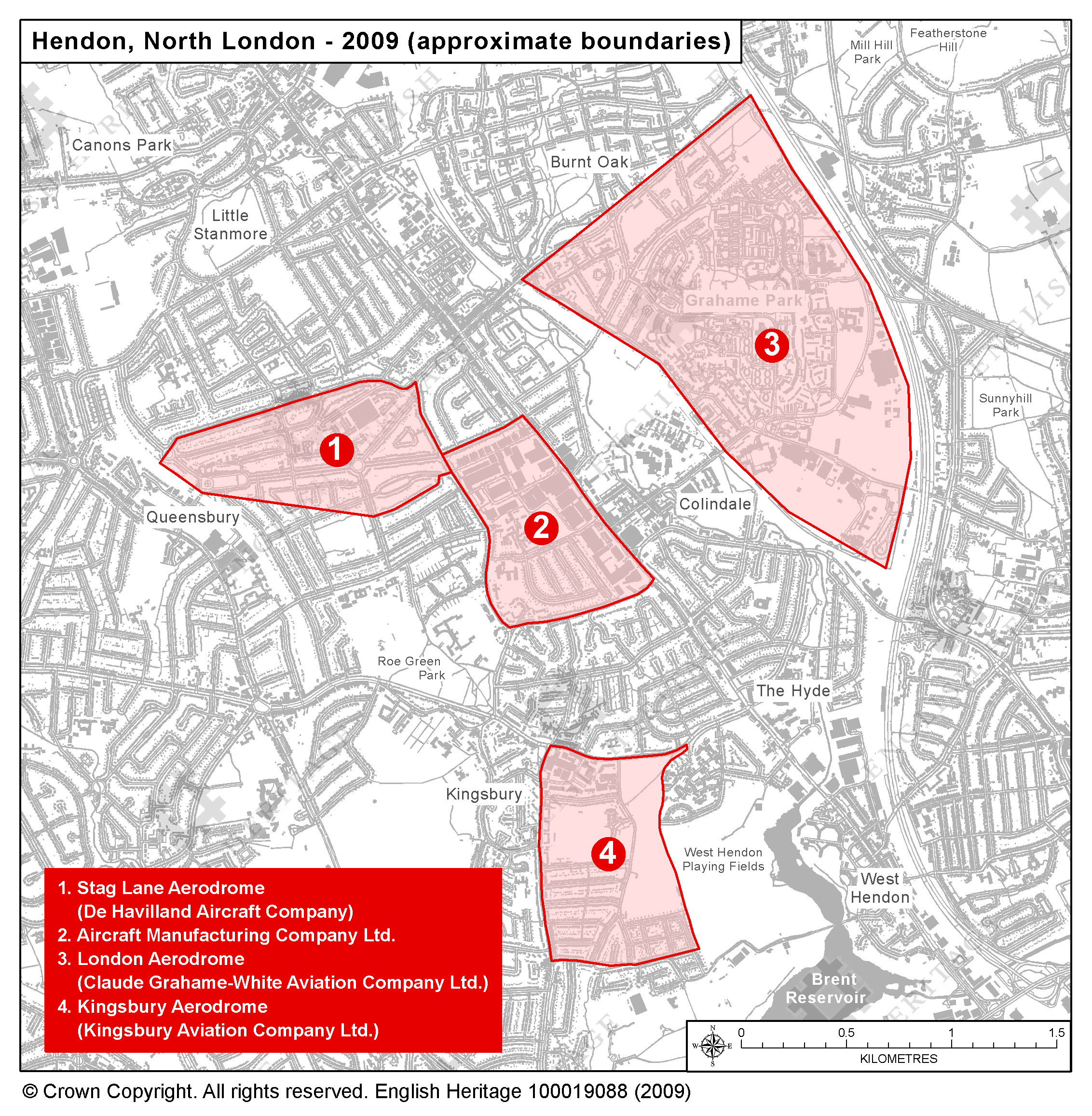
[1] The London and Provincial Aviation Co Ltd were at Stag Lane from 1915 to 1919/20. De Havilland's were there from 1920 to 1934. Housing for aviation workers had been built on Stag Lane in 1909/10. [2] Airco Ltd were in operation on Grove Park between 1911 and 1920. [3] The London Aerodrome was home to many more companies than just the Grahame-White Co Ltd from 1911 into the 1920s. [4] The Kingsbury Aviation Co Ltd were operational from 1917 at Kingsbury Green; aviation workers' housing at Roe Green Village was built in 1916. |
Katy Whitaker |
|
|
At first Aerofilms Ltd hired pilots and aircraft from Airco Ltd, Holt-Thomas's large company based on the Edgware Road on the site of The Grove. When Airco went into liquidation and Geoffrey De Havilland formed the De Havilland Aircraft Co Ltd, Aerofilms used the same pilots and machines based at the DH Stag Lane aerodrome just up the road. Most famously, Alan Cobham piloted Aerofilms' jobs in 1921 with photographer A.O Russell.
|
Katy Whitaker |
|
|
The company moved offices to Colindale Road in 1928/29. Since 1924/25 they had been based in Aerial House on the Edgware Road.
|
Katy Whitaker |
|
|
"Aeroville" was built by Claude Grahame-White alongside The London Aerodrome originally as housing for local aviation industry workers.
|
Katy Whitaker |
|
|
Claude Grahame-White's London Country Club on The London Aerodrome, Aerofilms Ltd's first home - they had use of a suite, using the bedroom as an office and bathroom as a darkroom!
|
Katy Whitaker |
|
|
The London Aerodrome at Hendon was Aerofilms Ltd's home when they started business in 1919. Claude Grahame-White, who had provided £3000-worth of financial backing to start the company, had bought the land in Hendon and opened the aerodrome in early 1911. Much of the aerodrome and its buildings had been requisitioned during World War I, so at the time that Aerofilms Ltd commenced operations Grahame-White was tied up in compensation claims on the Government.
|
Katy Whitaker |





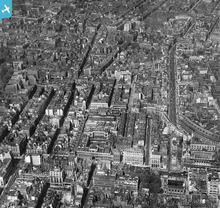





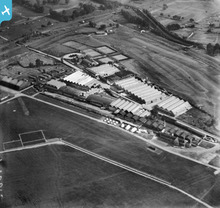










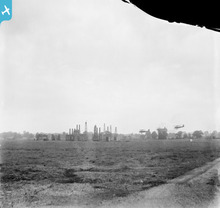


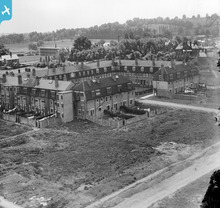


see image record